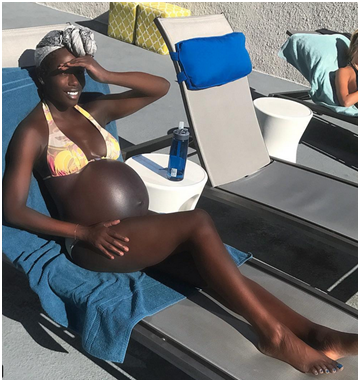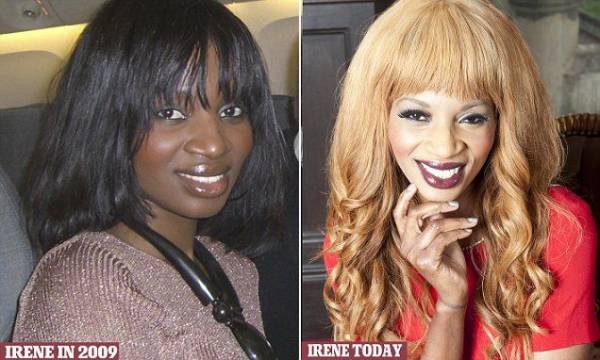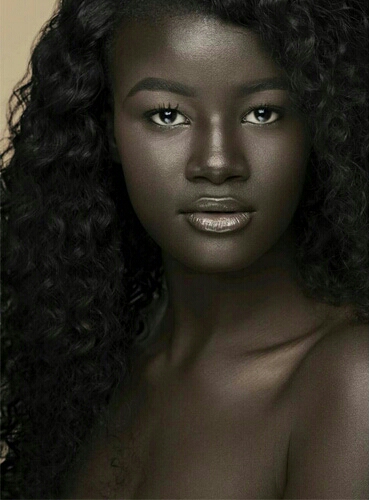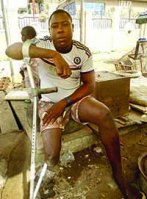Has 4 wives, 11 children
By Vincent Kalu
Begging for a living is hardly an enviable means of
livelihood, but for Adamu Hassan Yauri, it is his source of blessing.
After his life seemingly ground to a halt and he found himself stranded
at life’s dead-end, beggary offered him an alternative route to an
honourable life. Through boom and bust these past 19 years, he has
flourished, married four wives, fathered 11 children and sustained his
large family on beggary proceeds.
The decision to earn a living as beggar was forced upon him by
circumstances beyond his control, following an automobile accident in
1998 that led to the amputation of his right leg.
The native of Yauri Local Government Area, Kebbi State spoke with
Saturday Sun
at his residence in Igando, Lagos. He debunked any misconceptions about
him being a polio victim. According to him, he grew up as a normal
human being without any defect and was on his way to making a success
out of his life, attending school and at the same time trading in onions
from his home town in the north to the southeast town of Onitsha,
Anambra State. But in 1998, his life took a sudden turn. It started
first with his business partner who fractured his legs in an automobile
accident.
“I went to visit him at the hospital. On my way home, I was involved
in a motorcycle accident,” he recalled. “Me and my parents spent all
our savings on hospital bills, yet doctors couldn’t save my leg.
Eventually, they amputated my right leg.”
At the time, Yauri was a Senior Secondary One student. The
amputation of his limb was a double blow: “I had to drop out of school;
otherwise I never planned to stop my education at that level. The
accident also crashed the onion business I was doing to sponsor my
education.”
The hard knock of life soon set in. To spare him the misery of a
wretched life, one of his brothers sold him the idea of moving south to
Lagos where begging was a lucrative way of life.
“I followed my brother to Lagos in 1999, and as he told me, I found
that begging was lucrative. People took pity on me because of my
condition, and in no time, I was making money, enough to start planning
to get married.”
Marriage to four wives
He started this family by marrying one wife. After some time, he
married a second, then a third, and finally a fourth wife. One of his
spouses died, and he has lost two children too. Aside from these
tragedies, Yauri is a happy man, a proud father of nine children, six of
them including a set of twins by his first wife.
“I’m the one taking care of them,” he said with pride, “and God is
the one taking care of all of us. We may not have money to eat the best
of food, but we always make do with the little we have and we are always
happy.”

How come a disabled beggar was able to marry four women? Yauri avowed
it was easy for the women to fall in love and subsequently marry him.
“It was from this occupation that I married these women,” he boasted.
Of his three wives, the first is from Kwara State, the second from Kano,
while the third is a Nigerien. He is emphatic he and each of the women
started as lovers. He explained his love life with the story of his
first wife, Shafatu, from Ilorin, Kwara State, whom he first knew as a
secondary school student assisting her beverage seller -mother at Ikotun
market.
“All my women loved me dearly and accepted my proposal. Our initial
problem was their families’ objections, but my ladies said it must be me
or never. Don’t you see the work of God? I paid the bride price and
performed the necessary marriage rites for all of them; I didn’t get any
of them free, neither did I elope with any of them,” he said.
His women not only accepted him for what he is, they took him for
better or for worse, including his means of livelihood. And after
marriage, they joined him in his daily routine of begging to make ends
meet. Indeed, begging has become the family’s profession so much so some
of the younger children, who are not yet in school, loiter around their
mothers where they beg.
Satisfying his women
Don’t ask Yauri how he satisfies three women sexually. He would
respond with a chuckle, followed by a jovial question: “Is the number of
children, both living and dead, not evidence of my virility?”
For him, his disability neither extends to his libido nor affects his
ability to impregnate his wives. He will tell you his wives have no
cause to complain––though he is quick to add: “I cannot kill myself, I
am not a machine.”
He basked in his good fortune of being so blessed with offspring
despite his disability and poverty. Instead of complaining, he counts
his blessings. “There abound many able bodied men who are still
unmarried till date, and there are several rich men that have spent so
much money seeking medical help to have children and yet do not have
any. I am not gloating over their misfortune, but rather citing this as
an example of God’s love for me, a poor, ordinary, disabled beggar.”
God’s love for him extends to his wives’ ease during childbirth. “I
believe these blessings are God’s way to compensate me for my
disability,” he reflected. “If my wives were to deliver through
Caesarean Section, where would I get the money from?”
To increase his number of children or to not increase––the question,
Yauri said, is for God. “If God gives me more children, I will take
them, especially, as one wife has two children, while the other is left
with one after the death of her second child, and these two women may
want to have more children like the first wife who has six,” he
clarified.
Pains of polygamy
To ask him how he is enjoying polygamy, is to prompt a lamentation.
His woes are best summarised in his statement that “it is hellish
keeping three women under one roof.”
To avoid trouble, he tried to be equitable to all three women in the
all-important, but sensitive aspect of conjugal responsibility.
To this end, he came up with a ‘sleeping formula’: “To each woman, I
give two days in a week to sleep with her. Two days for each woman, and
one day of rest for me.”
He found out it was not enough to stave off trouble permanently.
“I did everything possible for all of them to live together in
harmony, but trouble and quarrels always erupted,” he lamented but
curiously, blaming the trouble on the Lagos environment.
His theory: “It was hellish keeping three wives together, especially
in Lagos, where everybody is crazy. Bring a naïve person to this city,
by the time she arrives, Lagos would open her eyes. If we were living
in the village where our relatives are around us, they (his wives) can’t
be a problem to me, even if they were four, because they would be
punished for disobeying me. But this is Lagos, where everybody’s brain
is something else. In the village, your brain is normal. But immediately
you arrive in Lagos, it is either other people scatter your brain or
you scatter it by yourself.”
He had resigned to a life of permanent querulous matrimony with the
women. “Usually, two ganged-up against one; if I did anything, one would
accuse me of favouring the other, and they would start quarreling with
me. It was a difficult situation.”
His wives’ endless bickering ultimately drove him to keep them in
separate apartments and locations, an arrangement they initially
rejected until he was able to convince them of a constant conjugal
visit. “I live with one here in Igando, I rented a house for one at
Okoko, and the other at Isheri,” he said, declaring “It is now that I
have peace. Before, it was so much trouble.”
Finding a way out of begging
While trying his best to meet his responsibility as the breadwinner,
Yauri admitted that his large family now constitutes a problem. As his
children grow older, proceeds from begging shrink, and become
insufficient to sustain the family. The hard reality had forced him to
seek other options to begging for a living.
His first alternative was to join the battalion of tricycle operators
who make healthy wages conveying commuters over short distance.
Unfortunately, his tricycle was stolen by thieves. Occasionally, his
friends who have other things to do borrow him their tricycles. When
such opportunity is not forthcoming, he goes a begging to make his usual
paltry proceeds.
After trying his hands on the tricycle business, Yauri became
somewhat ashamed of begging. Now in his 40s, he is eager to learn a
vocation that would help sustain his family.
He would welcome any help, from government or individuals, towards
training his children––though he insisted an explicit agreement would be
made in this regards so he would not be disadvantaged by such
benevolence.
Within the limit of his ability, he is ready to go any mile for the sake of a better future for his children.































